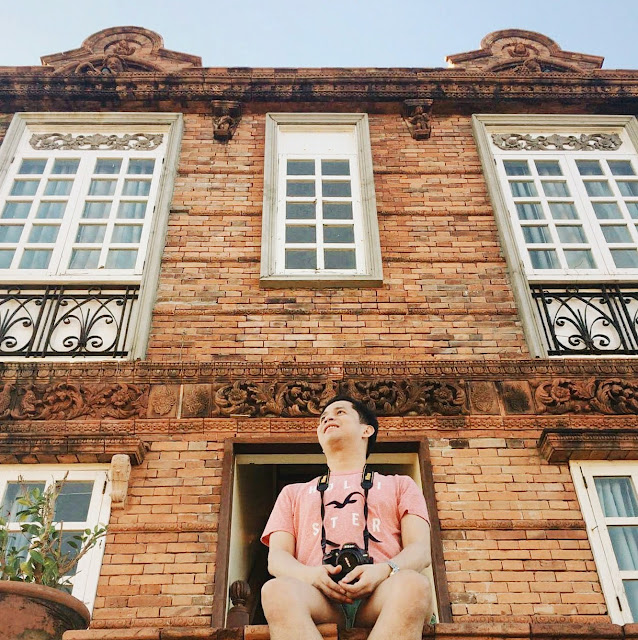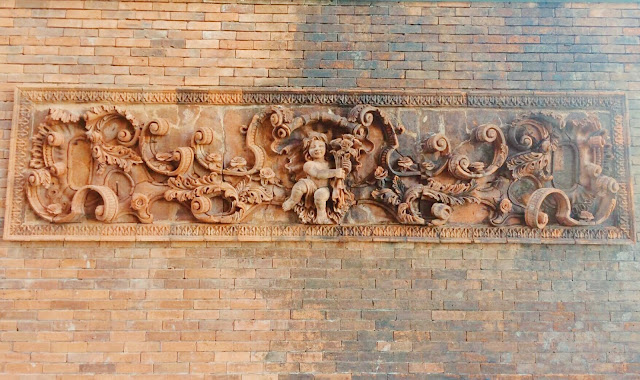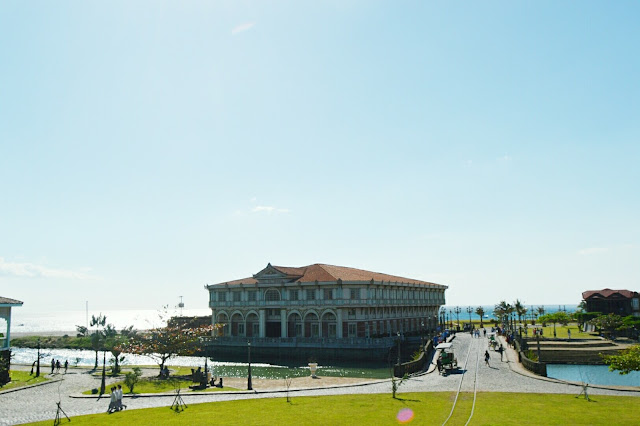A
flashback catch-sight of the past beyond a facade of the present
Discovering
different values and ways to get by in life is really interesting. It widens our
perspective.
Stretching far
back from my elementary days, my teachers used to say, “Learnings cannot only be found at the four corners of the room”.
Aside from textbooks, magazines, leaflets, Bato Balani, educational videos, and
Current Events Digest, History can also be experienced through the brick
pavements of some of the most beautifully preserved historical sites and places
across the country.
Don’t rush to
flip another page and join me to a journey that will gives you a proper glimpse of
the past, brick by brick, plank by plank, showcasing another Filipino
craftsmanship as I take you back to the 18th century that exerts a
strong cultural influence to the society.
Welcome to the
Peninsular Province of Bataan.
Welcome to Las
Casas Filipinas de Acuzar!
A living open
air museum of Philippine heritage, the resort is located on the sea side, along
Umagol River in Barangay Pag-asa, town of Bagac, province of Bataan (Central
Luzon). The resort is a sentient proof to the Spanish colonial era that lasted
for three centuries that made an indelible impression to our country.
The
400-hectare heritage resort is a home to 27 noble class-mansions, stone and
wooden stilt houses, Spanish colonial buildings, beach and pools, a restaurant,
a church that was carefully and meticulously dismantled, transplanted from
different parts of the country and rehabilitated, reassembled, restored, and
formed a theme resort, that leads to the birth of Las Casas Filipinas de Acuzar, in
2003.
The
man of the hour.
According to Wiki, it was Jose “Gerry”
Acuzar, the genius behind these majestic landmark in Bagac, who was
happened to be the owner of the New San Jose Builders.
Image from @colololz.com
Wiki time:
Each houses was dismantled brick by brick, numbered, transported to his
property, reassembled in the same order, and then restored. Acuzar bought
houses which were in a state of neglect, from the owners, and in some cases
also purchased the lot were the mansions stood.
They
have stone foundations on the first floor and are made of wood on the second
floor.
For parts that were missing, woodwork
and bricks were replicated to resemble the original structure.
As
we enter the heritage park, we are welcomed with a very accommodating local
tour guide (I forgot the name, sorry) but here’s our picture:
2:30PM, the
start of the Heritage Day Tour (their fee is included on the package). The tour
also includes an eye-opener, theatre-like drama played by young generations
portraying the life and teachings of the great Jose Protacio Rizal.
Image from google
Heritage Tour Schedule:
Morning
8:30am
9:30am
10:30am
11:30am
Afternoon
1:30pm
2:30pm
3:30pm
4:30pm
The
local tour guide (offering Tagalog and English language) shares valuable
insights and stories about each casas and their origins, forgotten history and
often narrate controversies surrounding the casas. (Reminder: Wear comfortable
shoes or flip flops, easy to take off and put on slippers in touring the casas)
One
story that strikes me most is the controversy of the old University of the
Philippines’ building that was once used for human extortion and pornography
during those years.
Picture of the Old UP Hallway
According to the
tour guide, some of the houses are originated from the province of Bulacan,
Pampanga, Laguna, Cagayan, Nueva Ecija, La Union, and the Old Manila, that was
eventually restored and replicated.
Image from @colololz.com
· Casa Baliuag 1 (built in 1898; owned by the Vergel de Dios
family). The house contains wood carvings with floral motifs. The original
owner of Casa Baliwag was Kapitan Fernando Vergel de Dios, then was inherited
by his eldest daughter, Juliana VD Reyes. The house was originally situated
right across the town's San Agustin church. Family members fondly called it
"Luwasan" since it was the house referred to when going towards the
town or to Manila. Kapitan Fernando had another house called "Hulo",
which was going towards the end of town, or sa "dulo".
· Casa Baliuag 2 was a house originally in the compound of Iglesia
ni Cristo in Baliuag.
The house was owned by a Gonzalez
· Casa Cagayan is a collection of four wooden houses built on
stilts. Such houses were usually regarded as houses of poor people in Cagayan in the early 1900s.
· Casa Candaba (built in 1780, owned by the Reyes family) was home
to the Spanish governor general whenever he visited Pampanga.
· Casa Lubao (built in 1920; owned
by the Arastia and Vitug families) served as storage for rice and sugar, and
became a Japanese garrison during World War II. A story goes that a Japanese
colonel stopped his men from burning the house in gratitude for the kindness of
the Arastia family who, unknowingly, hired him as a driver and gardener before
the war.
·
Casa Luna (owned by the Novicio family) now houses a museum.
Built in 1850, its original location was in Namacpacan (now Luna town) in La Union.
The town was later renamed to honour its revolutionary heroes and brothers
Antonio and Juan Luna, whose mother was a member of the Novicio clan.
·
Paseo de Escolta used old and new material to recreate commercial
buildings in the early 1900s in Manila.
With 17 rooms, it houses a hotel within the heritage resort. Its ground floor
houses shops.
· Casa Bizantina (built in 1890) is a three-story intricately designed bahay na bato (stone house) from Binondo,
Manila. The Instituto de
Manila (now the University of Manila) rented it for elementary and high school classes
until 1919 when the institute moved to Sampaloc, Manila. After World War II,
the building was leased to various tenants. Before it was demolished in 2009,
the house was used by 50 informal settlers.
· Casa Meycauayan (built in 1913 by the Escota family) was originally
built in City of San Fernando in Pampanga.
It was reconstructed in the 1950s in Meycauayan, Bulacan,
where Rogelio Urrutia bought it.
· Casa Unisan (built 1839) is the Maxino house in Unisan, Quezon.
The house is made of hardwood complete with trap doors. Only one girl survived
the massacre on the family and that tragedy makes the house much talked about
not only for its beauty. Its
ground floor is now a Filipino restaurant called the Marivent
Café.
· Casa Hidalgo (built in 1867) was the first campus of the
University of the Philippines’ School of Fine Arts. (Its house owner Rafael
Enriquez became its first director). Thence, it has housed the first school of
architecture in the country, a bowling alley, a dormitory and flesh joint.
· Casa Biñan (Alberto House) is a replica of the house of Teodora Alonzo, the
mother of the Filipino freedom fighter Dr. Jose Rizal.
Acuzar used the original wooden door, stairs and a few planks when he recreated
the house. He abandoned the planned donation of the house by its current owner,
Gerardo Alberto, amid protests by heritage advocates and local officials.
·
Casa Jaen I is the Don Hilarion Esquivel House built during the
1900s and won as the House Beautiful Award in 1917 by the Sunday Tribune.
Sanctuario de San Jose or the Church of St. Joseph
Touring around photos:
HOW TO GET THERE:
Las
Casas Filipinas de Acuzar can be accessed in multiple ways.
By own car:
Bataan is accessible via the Subic
Clark Tarlac Expressway (SCTEX) and Northern Luzon Expressway (NLEX). There are
buses running direct to Balanga town proper. Balanga Town proper is about 125
kms. northwest from Manila. From Olongapo City, you may take the Victory Liner
Buses. Tricycles and jeepneys are the primary modes of transport around Bataan.
By Public Transportation:
From Pasay Rotonda along EDSA (below MRT station)
·
Take Genesis Bus to Balanga Bus Station (trip starts at 4:00am
every 30 minutes)
· From the bus station, take the jeepney going to Bagac or Morong
(Bagac-bound has a limited time while Morong-bound has a longer time)
· Upon reaching Bagac, get down at the Filipino Japanese Friendship
Tower and go to the tricycle station
·
Take tricycle going to Las Casas Filipinas De Acuzar (Gate 5
entrance)
-Overall fare: approximately PHP 300+
per person
Via Cubao along EDSA (below MRT station)
· Take the Genesis Busis or Bataan Transit along EDSA Cubao (trip
starts at 4:00am every 30 minutes) to Balanga Bus Station
· From the bus station, take the jeepney going to Bagac or Morong
(Bagac-bound has a limited time while Morong-bound has a longer time)
· Upon reaching Bagac, get down at the Filipino Japanese Friendship
Tower and go to the tricycle station
·
Take tricycle going to Las Casas Filipinas De Acuzar (Gate 5
entrance)
-Overall fare: approximately PHP 270+
per person
Admission Fee: Php. 1, 500.00 (January 7, 2017 update)
They also offer hotel
accommodation located inside the heritage park, check their website at http://www.lascasasfilipinas.com
For
a non-hassle booking, safe trip and affordable deals:
Check out the Adventurer's Travel
Treats by
Ms. Laarni Mauricio
Piamonte (100%
guaranteed, they are beyond accommodating, may pa-yumburger pa!)
Itinerary:
5:40am – Meet up at SM North Edsa
6:00am – ETD to Bataan
9:00am to 11:30am – ETA Mount Samat
12:00pm – Lunch at Ima Pamangan (Price Ranges from Php.80:00-Php.100.00/Ala Carte Meal and Php.200.00 for the buffet service.) (The foods are great!)
1:00pm onwards – ETA Las Casas Filipinas de Acuzar
7:00pm – ETD to Manila
9:30pm – Drop off SM North
5:40am – Meet up at SM North Edsa
6:00am – ETD to Bataan
9:00am to 11:30am – ETA Mount Samat
12:00pm – Lunch at Ima Pamangan (Price Ranges from Php.80:00-Php.100.00/Ala Carte Meal and Php.200.00 for the buffet service.) (The foods are great!)
1:00pm onwards – ETA Las Casas Filipinas de Acuzar
7:00pm – ETD to Manila
9:30pm – Drop off SM North
📍 You
can also visit their Facebook page at http://www.facebook.com/adventurerstravel or just click on the tagged
profile above, for more updates on fees and tours.
Our
dependable travel organizer, Ms. Laarni Piamonte
Las Casas
Filipinas De Acuzar
Brgy. Ibaba, Bagac, Bataan
2107, Philippines
Brgy. Ibaba, Bagac, Bataan
2107, Philippines
Landline: (+632) 332-5286 (+632)
877-4501 (+632) 332-5338 (+632) 355-3032
Mobile: 0917-872-9361
Front Desk Mobile: 0917-537-8418 (Sundays & Holidays only)
Mobile: 0917-872-9361
Front Desk Mobile: 0917-537-8418 (Sundays & Holidays only)
E-mail addresses:
reserve@lascasasfilipinas.com
marketing@lascasasfilipinas.com
anneorosco@lascasasfilipinas.com
dos@lascasasfilipinas.com
reserve@lascasasfilipinas.com
marketing@lascasasfilipinas.com
anneorosco@lascasasfilipinas.com
dos@lascasasfilipinas.com
Travel opens your heart, broadens your mind and fills your life
with stories to tell
-Paula Bendfeldt
#cjourney
IG:
instagram.com/cleiffordjourney
For
inquiries: +639773341716

















































































Your blog just wowed me♥️
ReplyDeleteThanks @adaventurer for the review
Delete